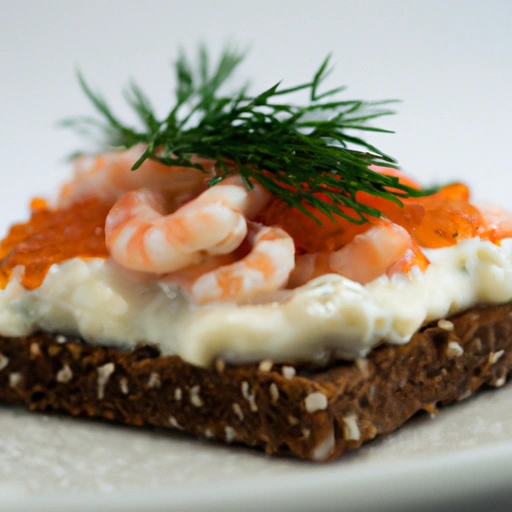Rejemad
Rejemad Recipe - A Scandinavian Delight
Introduction

Rejemad, a traditional Danish open-faced sandwich, is a delicious and easy-to-make dish that is perfect for a light lunch or snack. This recipe features a creamy mixture of prawns and dill on top of toasted bread, topped with a dollop of caviar for an extra touch of luxury.
History
Rejemad has been a popular dish in Denmark for many years, often enjoyed as a quick and tasty meal. The combination of prawns, dill, and mayonnaise on toast is a classic Danish flavor profile that is loved by many.
Ingredients
How to prepare
- Fold the dill into the mayonnaise and add the prawns.
- Season with salt and pepper.
- Butter the toast and, if desired, cover with fresh lettuce leaves.
- Spread the mixture over the toasted bread, top with a small amount of caviar, and garnish with lemon wedges and the remaining dill.
Variations
- Substitute the prawns with smoked salmon or crab meat for a different flavor profile.
- Add a sprinkle of chopped chives or parsley on top for extra freshness.
Cooking Tips & Tricks
Be sure to fold the dill into the mayonnaise gently to avoid crushing the delicate herbs.
- Season the prawn mixture with salt and pepper to taste, adjusting as needed.
- For an extra burst of flavor, consider adding a squeeze of lemon juice to the prawn mixture before spreading it on the toast.
Serving Suggestions
Serve Rejemad as an appetizer or light lunch alongside a fresh green salad or a bowl of soup.
Cooking Techniques
Toasting the bread adds a nice crunch to the dish and helps to hold the creamy prawn mixture in place.
Ingredient Substitutions
If you don't have caviar on hand, you can omit it or substitute with a sprinkle of chopped hard-boiled eggs for a similar texture.
Make Ahead Tips
You can prepare the prawn mixture in advance and store it in the refrigerator until ready to assemble the sandwiches.
Presentation Ideas
Arrange the Rejemad sandwiches on a platter and garnish with additional dill sprigs and lemon wedges for a beautiful presentation.
Pairing Recommendations
Pair Rejemad with a crisp white wine or a cold beer for a refreshing and satisfying meal.
Storage and Reheating Instructions
Store any leftover Rejemad in an airtight container in the refrigerator for up to 2 days. Reheat in a toaster oven or under the broiler until warmed through.
Nutrition Information
Calories per serving
Each serving of Rejemad contains approximately 250 calories.
Carbohydrates
Each serving of Rejemad contains approximately 20 grams of carbohydrates.
Fats
Each serving of Rejemad contains approximately 15 grams of fats.
Proteins
Each serving of Rejemad contains approximately 10 grams of proteins.
Vitamins and minerals
Rejemad is a good source of vitamin C, iron, and calcium.
Alergens
This recipe contains shellfish (prawns) and eggs (mayonnaise), which may be allergens for some individuals.
Summary
Rejemad is a balanced dish that provides a good mix of carbohydrates, fats, and proteins, along with essential vitamins and minerals.
Summary
Rejemad is a classic Danish dish that is easy to make and full of delicious flavors. With a creamy prawn mixture on top of toasted bread, this open-faced sandwich is perfect for a light and satisfying meal.
How did I get this recipe?
I remember the excitement that washed over me when I first saw this recipe for Rejemad. It was many years ago, when I was just a young girl, and I had been invited to a dinner party at a friend's house. As soon as I walked in, the aroma of the dish filled the room, and I knew I had to find out what it was.
I made my way to the kitchen, where I found my friend's grandmother, a sweet older woman with a twinkle in her eye. She was busy stirring a pot on the stove, and when I asked her what she was making, she smiled and told me it was Rejemad, a traditional Danish dish that her family had been making for generations.
Intrigued, I asked if she would teach me how to make it, and she happily agreed. She began by showing me how to clean and peel the shrimp, a task that seemed daunting at first but soon became second nature. Next, she sautéed the shrimp in butter and garlic until they were perfectly cooked and fragrant.
As the dish came together, I couldn't help but marvel at the simplicity of the ingredients and the depth of flavor they created. The shrimp were tender and flavorful, the butter rich and indulgent, and the garlic added a subtle yet satisfying kick.
After we finished cooking, we sat down to enjoy the Rejemad together, and I knew I had found a new favorite dish. The flavors were so comforting and familiar, yet unlike anything I had ever tasted before. I savored each bite, feeling grateful for the opportunity to learn this recipe from a kind and generous mentor.
From that day on, I began making Rejemad regularly, experimenting with different variations and adding my own personal touch to the dish. I shared it with my family and friends, who were equally enamored with its simple yet satisfying flavors.
Over the years, I have continued to make Rejemad, passing down the recipe to my own children and grandchildren. It has become a beloved tradition in our family, a dish that brings us together and reminds us of the importance of sharing food and memories with the ones we love.
I am grateful to that kind grandmother who first introduced me to Rejemad, and I will always cherish the memories of learning how to make this delicious dish. It is a recipe that holds a special place in my heart, a reminder of the joy and connection that comes from sharing good food with those we hold dear.
Categories
| Caviar Recipes | Dill Recipes | Lettuce Recipes | Mayonnaise Recipes | Scandinavian Recipes | Scandinavian Snacks | Snack Recipes |